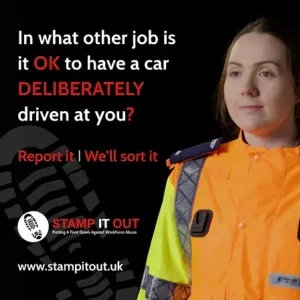
As the highways industry marks the Respect our Workforce Week – a campaign encouraging those who work on our roads to report incidents of abuse and raising awareness of this issue – Brett Southgate, an Operations Manager at Highway Care shares some of his experiences of the types of abuse in question and what it feels like to be on the receiving end.
For most road users, the frequency and seriousness of road worker abuse will probably come as a surprise. Delays due to roadworks can be frustrating, but most drivers understand that work to maintain roads and make journeys safer is carried out to benefit them, rather than as a means of getting in their way. Most drivers wouldn’t dream of hurling insults, let alone objects, but the statistics are shocking – a fifth of highways operatives have had objects thrown at them while at work, and a quarter have experienced mental health issues as a result of abuse. Even the statistics don’t reveal the real danger though. We often have people yelling at us, swearing at us and generally being verbally abusive, but, for me, it’s the physical abuse that’s the most frightening and memorable.
An incident that took place when we were installing barrier late at night in a residential area springs to mind. The job had to be done at night to avoid disruption on the road during the day, but, of course, this did mean that there was a level of noise from the works for the residents. We were working outside a high rise block of flats, and a man started to yell abuse at us. The next thing we knew, he was throwing the contents of his fruit bowl at us from the window of his flat, several storeys up. When you tell people that someone has been throwing apples at you, it sounds comical. But an apple that wouldn’t do you much harm from a few feet away can become a deadly weapon when thrown from height. It’s not the weight of the apple, but the force it hits with after gathering speed on the way down that makes it so dangerous. At that point, we downed tools and took cover until the individual in question had been dealt with. We were straight back to work afterwards, but all of us were shaken because one of us could easily have been hit.
Because of how serious the incident could have been, the fruit missiles are very memorable, but that’s not the most unpleasant thing I’ve had thrown at me. I’ve also has bottles of urine thrown at me from vehicle windows. When you’re working in the dark, in all weathers, close to live lanes of traffic, it can be hard to see where something is coming from. But, trust me, if a plastic bottle full of liquid hits you, it really hurts; whether it’s been chucked from the cab of a HGV or hurled through the window of a car. And if the bottle splits or bursts open, that’s really unpleasant!
It’s not just the physical abuse that stays with you. Some of the most disturbing incidents I’ve been affected by have had more to do with verbal abuse or physical intimidation. Once, for example, we were working in a residential area at night and people came outside to see what we were doing. Instead of taking a look and going back inside, they set up chairs and sat in the garden, drinking beer, watching us and shouting abuse. We had to stop work and gather the team together to decide on the safest option for continuing the shift and progressing the work. Instead of splitting the team to work across two areas as originally deployed, we revised the plan and worked all together as a single team to get the job done faster and remove ourselves from the situation as quickly as possible. We spent the rest of our shift trying to focus on the job in hand, but the environment was very tense and we felt it could explode in seconds. It was really unpleasant wondering if and when the situation might escalate.
Fundamentally, no-one should have to feel abused or under threat while at work, no matter where their workplace may be. Highway Care is extremely supportive of us and has been vocal on this issue, but the only people that can stop aggressive behaviour towards road workers are those responsible for the abuse, so it is the responsibility of every road user to #ThinkRespect.


